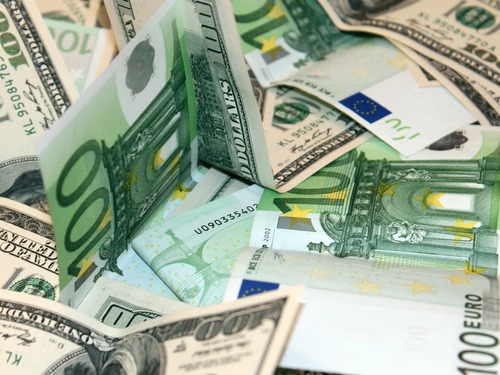L’internationalisation financière de l’euro demeure stable
En 2018, les entreprises européennes ont favorisé l’utilisation du dollar dans leurs échanges commerciaux, avec 45 % des transactions contre 42 % pour l’euro. En 8 ans, l’utilisation de la monnaie unique a reculé. Comment l’expliquer ? Quel avenir pour le projet européen ? Éléments de réponse.
Le dollar reste la valeur refuge incontestée
Le 9 juin 2020, la Banque centrale européenne (BCE) a publié son rapport annuel sur le rôle international de la monnaie unique. Ce document, qui se penche sur l’année 2019, indique que la part de marché de l’euro est en baisse depuis une décennie, que ce soit pour les réserves financières, le libellé des contrats ou les prêts internationaux. Celle-ci s’établissait à 24 % avant la crise financière de 2008. Elle est désormais de 19 %, marquant une légère hausse depuis un point bas à 16 % il y a 3 ans.
Le rapport souligne que si « l’euro reste la deuxième monnaie la plus utilisée au monde », elle ne parvient pas à s’imposer face au dollar qui représente 60 % des réserves financières de devises, soit près de 3 fois plus que la monnaie européenne. Dans la seule catégorie des paiements, l’euro a une part de marché (35 %) proche de celle du billet vert (42 %).
La lente internationalisation de la monnaie européenne s’explique également par le niveau très bas des taux d’intérêt dans la zone euro qui a incité les étrangers à émettre de la dette en euro à un coût particulièrement bas. En 2019, les entreprises ont émis près de 300 milliards de dollars d’obligations libellées en euros et les sociétés américaines représentent la moitié de ce montant. Ainsi, l’euro devient la devise d’emprunt mondiale ce qui la rapproche du yen, une devise refuge qui baisse quand les marchés sont bien orientés et qui augmente quand les inquiétudes reviennent.
Quelles perspectives pour l’euro ?
Dans le contexte de crise pandémique actuel, plusieurs spécialistes s’interrogent sur la nouvelle crise de la zone euro à venir. Pour faire face aux conséquences de la crise sanitaire, l’État a déjà été contraint d’investir des milliards d’euros afin de soutenir la trésorerie des TPE et des PME, d’accorder des moratoires sur les charges sociales voire des dégrèvements fiscaux. Il a également soutenu le dispositif de chômage partiel dont le coût reste pour l’heure inconnu. De son côté, pour calmer les marchés, la BCE a lancé fin mars un plan de sauvetage colossal en décidant de mener un rachat de titres pour 750 milliards d’euros.
Ainsi, la principale crainte des acteurs quant à l’avenir du projet européen concerne surtout les caractéristiques des marchés qui limitent l’attrait de la devise européenne. Une chose est sûre, les effets de la crise du coronavirus seront « dévastateurs » pour la zone euro, selon la Commission européenne qui anticipe une récession sans précédent en 2020.
